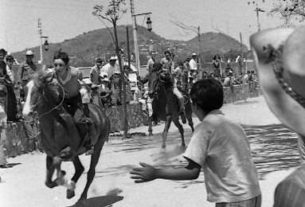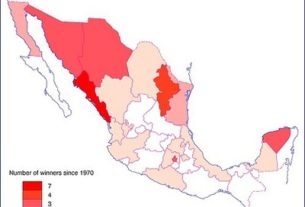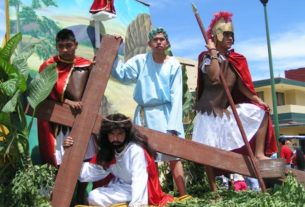Carlos Fuentes was an internationalist from birth. Though one of Mexico’s best-known citizens, he was born on November 11, 1928, in Panama, where his father represented the Mexican government. Mexico played only a minor role in his early childhood, most of which was spent in Washington, DC. He also lived in Chile and Argentina.
In 1944, at the age of sixteen, he came to Mexico. He received a law degree at Mexico’s National Autonomous University and in 1950 went to Geneva, Switzerland, to serve as secretary to the Mexican delegate to the International Law Commission of the United Nations. While in Geneva, Fuentes wrote his doctoral dissertation while also working as press secretary at the U.N. Information Center. He returned to Mexico in 1951.
Before long, Fuentes was following two careers — diplomacy and literature. His first major work, published in 1954, was Los días enmascaradas (“The Masked Days”), containing three short stories. In 1956 he teamed up with Manuel Carballo to found a literary publication called Revista Mexicana de Literatura. Between 1956 and 1959, in a role that combined government service and the arts, Fuentes was director of international cultural relations for Mexico’s Ministry of Exterior Relations (Foreign Affairs).
Fidel Castro came to power in 1959 and Fuentes was an early and enthusiastic supporter of the Cuban Marxist leader. This militant stand brought him into disfavor with the U.S. government and Fuentes was barred for a time from entering the United States. He moved to Paris in the mid-sixties and in 1975 was appointed Mexican ambassador to France. But he resigned in 1977. He had become dissatisfied with his government, then headed by President José López Portillo.
Unlike David Alfaro Siqueiros, who was a consistent leftist, Fuentes meanders all over the ideological lot. When the Cuban poet Padilla, a personal friend, was jailed, Fuentes became disillusioned with Castro. Though he served several Mexican presidents in a diplomatic position, he joined a march to protest repression of the teachers’ union in the late fifties and denounced the Tlatelolco student massacre in 1968. Today he seems to have made peace with a government that he has alternately served and skewered. The gist of his much-discussed Newsweek article, “Let Them Eat Enchilada,” is that if Mexicans prefer a one-party government, let them have it.
If the ideological orientation of Fuentes resembles a roller coaster ride, there is nothing up-and-down about his literary career, which has been an unbroken string of successes and awards. In 1967 he won the Biblioteca Breve prize in Barcelona, in 1975 the Javier Villarutia prize in Mexico City and in 1977 the Rómulo Gallegos prize in Venezuela. In the same year he won the Premio de Embajadores de Paris, in 1979 the Premio Alfonso Reyes in Mexico City, in 1984 the National Prize for Literature in Mexico and in 1987 the super-prestigious Miguel Cervantes prize.
Possibly because Fuentes has spent so much of his life outside Mexico, a dominating theme in his work is the search for Mexican national identity. Of his eleven novels, it is in The Death of Artemio Cruz that this mindset is expressed most strongly. Published in 1962, the book highlights the failure of post-revolutionary Mexico to implement the goals of the Revolution. The author’s technique is to narrate, through a series of flashbacks, the story of a dying tycoon named Artemio Cruz who came to the Revolution an idealist but who was corrupted by success and wealth. But not entirely. Though Artemio has become a rich, powerful man who owns businesses, publishes his own newspaper, and advocates breaking a railroad strike, he still remains a revolutionary in his anticlericalism and in encouraging Lorenzo, the son he adores, to go to Spain and fight on the Loyalist side-during the Civil War. In a Manichean scenario, it is as if an angel of revolutionary purity and a devil of corrupt power-seeking are fighting over the soul of the dying old cacique (regional boss).
Other flashbacks reveal what pushed Artemio into revolution in the first place. His father was the pampered son of a colonel on the staff of dictator Antonio López de Santa Anna — and his mother an Indian girl he raped. So Artemio resentfully grows up in the worst of both worlds: his upper-class lineage negated by the stigma of mixed blood and illegitimacy. Though allowed to live in a hut on the family’s vast property, he is never allowed into the hacienda.
As a revolutionary, Artemio is not only a gifted soldier but shows an unerring instinct for picking the winning side. He supports Madero against Díaz, Huerta against Pascual Orozco (the first revolutionary to turn against Madero), Villa-Carranza-Obregón against Huerta, Carranza-Obregón against Villa and Obregón against Carranza.
In sharp contrast to Artemio’s acuity in picking political winners is his luck with women. Regina, a young soldadera (camp follower) who is the great love of his life, is captured and executed by the federals. He then becomes infatuated with Catalina, daughter of a conservative Catholic landowner. When Catalina fails to reciprocate his ardor, Artemio proposes a cynical deal to her father: his property will be spared from revolutionary pillage if Catalina agrees to marry him. Though Catalina submits to the arrangement, for the rest of her life her attitude toward her unwanted husband is one of cold, malevolent hatred. This feeling is in no way mitigated by her bearing him two children. “At night you conquer me,” she says during a 1924 confrontation, “but I defeat you during the day.”
Catalina’s terrible last victory comes while her husband is on his deathbed. Fully aware of his anticlericalism, she calls a priest. When Artemio is burning with fever, she even refuses his request that a window be opened. As he lays dying, his body is a mass of putrefaction.
A grim story — but one that dramatically showcases the intensity of the author’s desire to lock into the most poignant period of Mexico’s history.
In the manner of Dickens, Balzac and Sinclair Lewis, Fuentes spent a great deal of time familiarizing himself with the social environments he would later use in his books and short stories. In one of his plays, deceptively titled Todos los gatos son pardos (“All Cats are Brown”), he presents an epic tableau of the Conquest in which the Aztec deity Quetzalcoatl is shown as representing life, love and justice. Significantly, he links the injustices of the Conquest to the horror of the 1968 Tlatelolco massacre. For all his critical and commercial success and political tergiversations, it would appear that Carlos Fuentes is a man very much in the market for a spiritual anchor.
Carlos Fuentes Discussion Forum



